Easy Shopper
Smart Shopping Cart
MetroClick EASY Shopper transforms traditional shopping carts into intelligent retail solutions that enhance customer engagement throughout the store visit by bringing the digital experience into the physical location with cashier-less checkout and interactive navigation.
Eliminate checkout lines while reducing operational costs
Built-in barcode scanner with load cell scale technology lets customers scan and weigh items as they shop, reducing theft and labor costs while eliminating wait times at checkout.
Deliver targeted promotions based on real-time customer behavior
Integrated GPS and camera systems track cart position throughout the store to display personalized advertisements and promotional offers at the exact moment customers need them most.
Industrial-grade reliability for demanding retail environments
IP65-rated aluminum construction with 18-hour battery life and Intel Pentium N4200 QuadCore processor ensures consistent performance in high-traffic locations with simple overnight charging.
Customer Benefits
Our digital shopping cart skips lines, finds products, & saves money
Scan items as you shop, navigate directly to products, and access every available discount through one intelligent cart that eliminates checkout delays and maximizes savings.
 Complete purchases without waiting in checkout lines or dealing with cashiers
Complete purchases without waiting in checkout lines or dealing with cashiers Locate specific products instantly using integrated store navigation systems
Locate specific products instantly using integrated store navigation systems Capture every available discount and special offer automatically during shopping
Capture every available discount and special offer automatically during shopping
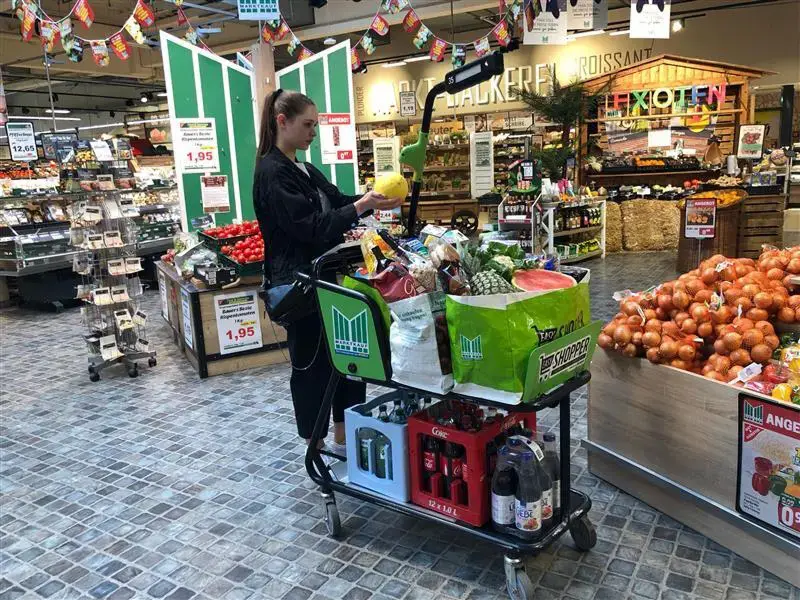
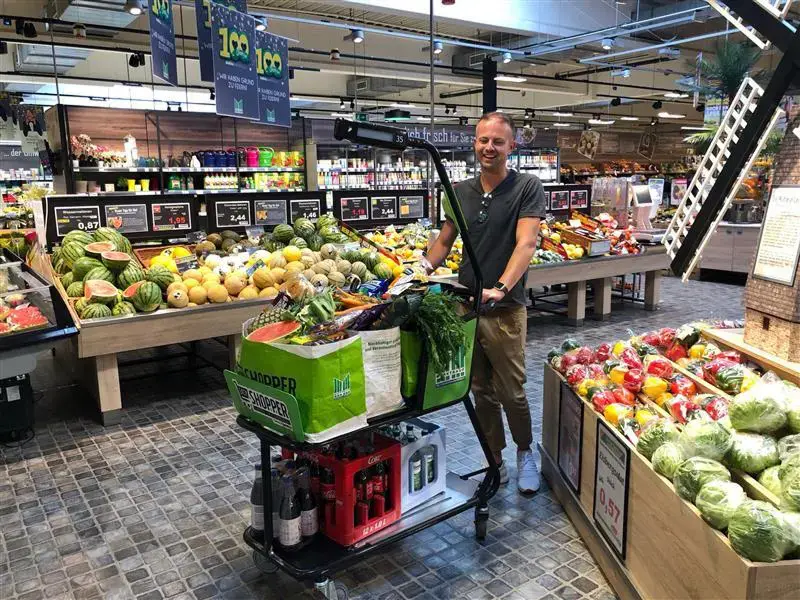
Business Intelligence
Smart cart data that drives revenue growth
Track exact customer movements and shopping patterns to deliver precision-targeted promotions that increase basket size and build lasting brand loyalty.
 Deliver promotions to customers at their exact moment of purchase decision
Deliver promotions to customers at their exact moment of purchase decision Trigger personalized offers based on real shopping behavior and location
Trigger personalized offers based on real shopping behavior and location Measure campaign effectiveness with precise cart tracking and purchase data
Measure campaign effectiveness with precise cart tracking and purchase data
Trusted by industry leaders to power better customer experiences
Complete retail automation cart system
Complete intelligent shopping solution for retail automation. Features 11.6″ touchscreen with embedded IPC, barcode scanner, load cell scale, dual cameras, and GPS tracking to transform the traditional shopping experience with cashier-less checkout and personalized promotions.
Technical Specifications:
- Display: 11.6″ capacitive touchscreen, 1920×1080, 10-point multi-touch, edge-to-edge glass
- Processing: Intel Pentium N4200 QuadCore, 4GB DDR3L RAM, 128GB SSD
- Operating System: Linux Ubuntu or Windows 10 options available
- Connectivity: Wi-Fi, GSM cellular, GPS tracking, USB-C connection
- Power: 18-hour battery life, 2-pin charging connector, overnight charging
- Features: IP65-rated aluminum housing, dual cameras, barcode scanner, load cell scale
- Protection: 7H and IK08 protection glass, anti-glare surface treatment
- Safety: Children seat (15kg capacity), spray paint coating finish
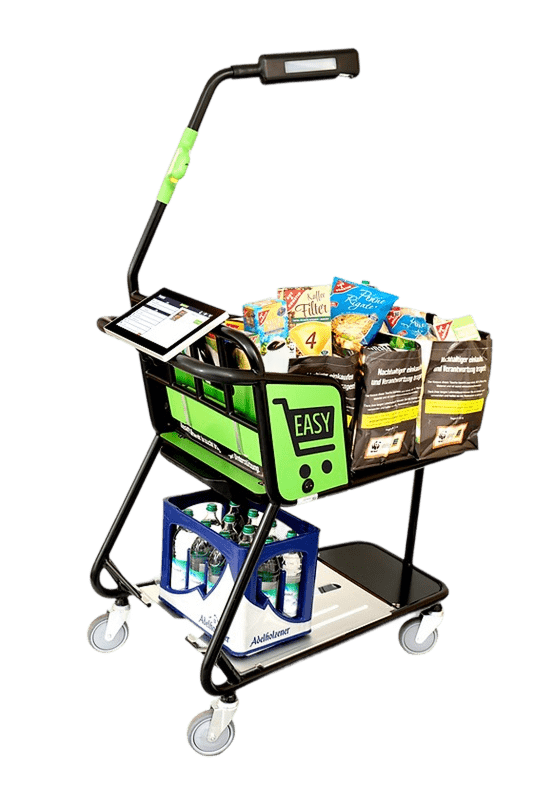
Discover the versatility built into each product
Built for Every Environment
Trust in ruggedized, rated, reliable and robust devices of all shapes and sizes that perform flawlessly indoors or out.
Engage and Inform
Guide users through effortless, self-driven, interactive experiences or stream advertisements and promotions 24/7 on optically bonded, enhanced viewing touch screens.
Modular in Design
Easily configure, connect and scale devices to suit different locations, functions and use cases, while streamlining maintenance, serviceability and operational expenses.
Unapologetically Authentic
Fit any space with aesthetics and branding that drives emotional resonance and authentic connections to your true brand.
Other hardware options
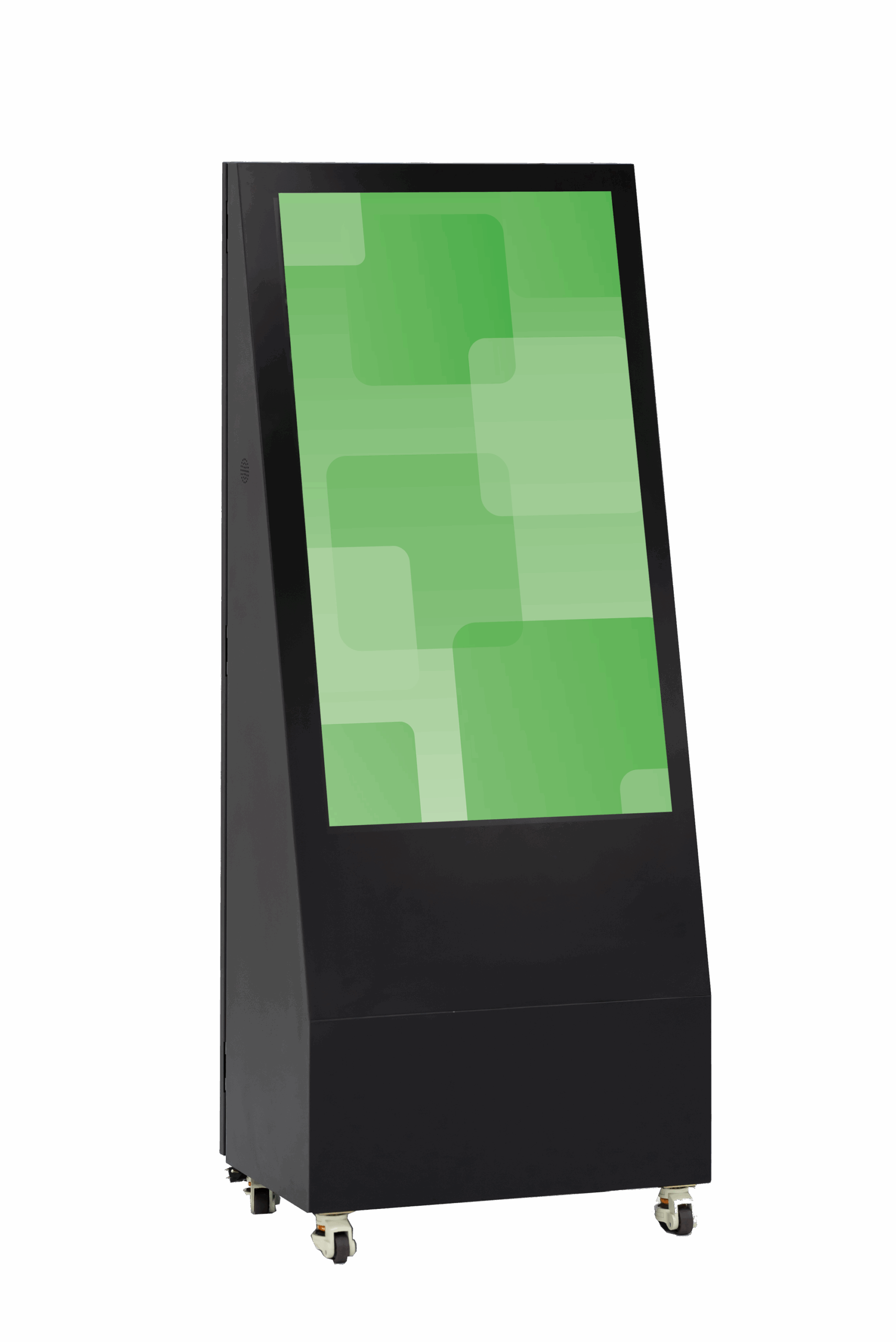
Large Format Kiosks
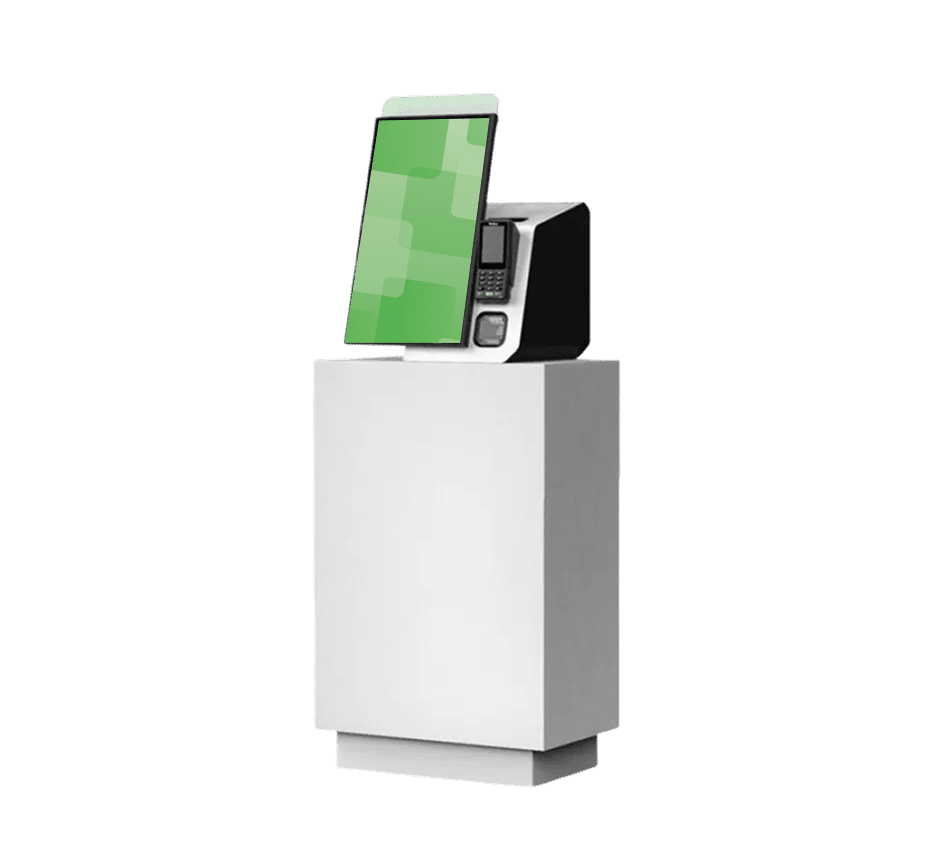
Transactional Kiosks
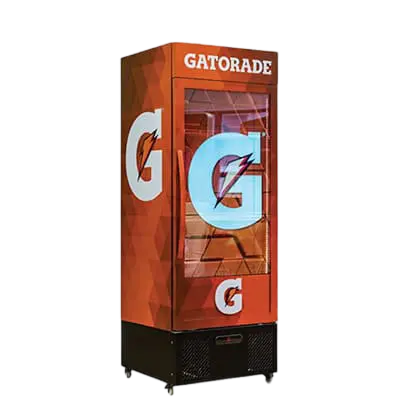
Immersive Kiosks
More Information
Revolutionizing Retail Through Intelligent Shopping Cart Technology
The transformation of traditional shopping carts into intelligent retail assistants represents a fundamental shift in how consumers interact with physical stores. Smart shopping cart systems combine mobility, interactivity, and real-time data processing to create seamless shopping experiences that rival online convenience while maintaining the tactile advantages of in-store shopping. These advanced solutions address multiple pain points in traditional retail operations, from checkout bottlenecks to inventory management challenges.
Modern smart cart technology integrates sophisticated hardware components, including touchscreen displays, barcode scanners, weight sensors, and wireless connectivity, into ergonomic designs that maintain familiar shopping cart functionality. This convergence of digital capabilities with physical shopping tools creates opportunities for retailers to enhance customer satisfaction while gathering valuable behavioral data that informs merchandising decisions and operational improvements.
Technical Architecture of Smart Shopping Systems
The foundation of intelligent shopping cart systems relies on robust embedded computing platforms capable of handling multiple simultaneous processes. Real-time item recognition, running total calculations, promotional content display, and navigation assistance all require significant processing power delivered within power-efficient parameters. Advanced systems incorporate edge computing capabilities to minimize latency and ensure consistent performance even in areas with limited network connectivity.
Sensor integration plays a crucial role in cart intelligence. Weight sensors in the basket detect when items are added or removed, triggering automatic rescanning prompts to maintain inventory accuracy. Proximity sensors activate displays when shoppers approach, conserving battery life during idle periods. Some implementations include computer vision systems that can identify produce items without barcodes, streamlining the shopping process for fresh goods.
Enhancing Customer Experience Through Digital Integration
Personalized Shopping Journeys
Smart shopping carts transform generic store visits into personalized experiences tailored to individual preferences and shopping patterns. Upon customer identification through loyalty cards or mobile app integration, the cart can display customized shopping lists, highlight relevant promotions, and suggest complementary products based on purchase history. This personalization extends to navigation assistance, with the software calculating optimal routes through stores based on shopping list items.
Dynamic pricing displays eliminate confusion about promotional items or bulk discounts. As customers add products to their carts, the system automatically applies applicable discounts and displays savings in real-time. This transparency builds trust and encourages larger basket sizes by clearly communicating value propositions throughout the shopping journey.
Streamlined Checkout Processes
The most transformative aspect of smart shopping carts involves reimagining checkout experiences. Self-scanning capabilities eliminate traditional checkout lines, allowing customers to complete purchases directly from their carts. Integrated payment systems support various methods, including credit cards, mobile wallets, and store credit accounts. Some implementations enable customers to walk out after completing payment on the cart, with security systems automatically verifying purchased items.
Queue management features help customers avoid crowded checkout areas by suggesting optimal timing or directing them to less busy payment stations. For stores maintaining traditional checkout options, smart carts can transmit basket contents to cashier stations, eliminating the need to unload and reload items during payment processing.
Operational Benefits for Retail Management
Real-Time Inventory Tracking
Smart shopping carts provide unprecedented visibility into inventory movement throughout stores. As customers shop, the system tracks which items leave shelves and at what rate, enabling dynamic inventory management. This real-time data helps prevent stockouts by triggering replenishment alerts before shelves are empty. Integration with backend inventory systems ensures accurate stock levels across all channels.
Heat mapping capabilities reveal traffic patterns and dwell times in different store sections. This information guides planogram optimization and helps identify high-value promotional locations. Retailers can test different product placements and measure impact on sales velocity almost immediately, enabling agile merchandising strategies.
Labor Optimization and Cost Reduction
Automated checkout processes through smart carts reduce labor requirements at traditional registers, allowing staff reallocation to more value-added activities like customer assistance and inventory management. The reduction in checkout friction also decreases cart abandonment rates, particularly during peak shopping periods when long lines typically deter purchases.
Maintenance scheduling benefits from predictive analytics that monitor cart component health. Battery life tracking, wheel wear assessment, and display performance monitoring enable proactive maintenance that prevents equipment failures during customer use. This predictive approach reduces both maintenance costs and customer frustration from equipment malfunctions.
Implementation Considerations for Retailers
Infrastructure Requirements
Successful smart cart deployments require robust wireless infrastructure throughout retail facilities. High-density WiFi networks must support numerous simultaneous connections while maintaining low latency for real-time updates. Strategic placement of charging stations ensures carts remain operational throughout business hours, with rapid charging capabilities minimizing downtime.
Backend system integration represents another critical consideration. Smart carts must communicate seamlessly with point-of-sale systems, inventory databases, customer relationship management platforms, and analytics tools. API-based architectures facilitate these integrations while maintaining system flexibility for future enhancements.
Security and Privacy Protocols
Customer data protection requires comprehensive security measures throughout innovative cart systems. Encrypted communications prevent interception of payment information or personal data. Tokenization of payment methods ensures sensitive financial information never resides on cart systems. Privacy-by-design principles guide feature development, with precise opt-in mechanisms for data collection and personalization features.
Physical security considerations include anti-theft mechanisms that prevent cart removal from designated areas. GPS tracking capabilities assist in the recovery of misplaced or stolen units while providing valuable data about cart utilization patterns within store premises. Tamper-evident designs discourage vandalism and ensure system integrity.
Market Adoption and Industry Trends
Global Implementation Patterns
European markets have led smart shopping cart adoption, with successful deployments demonstrating significant returns on investment through increased basket sizes and improved customer satisfaction. North American retailers are accelerating implementations as consumers increasingly expect frictionless shopping experiences that match online convenience.
Different retail segments show varying adoption patterns. Grocery stores benefit from frequent shopper visits and large basket sizes that justify technology investments. Home improvement retailers leverage navigation features to help customers locate items in vast store layouts. Department stores use smart carts to bridge online and offline inventory, enabling endless aisle capabilities.
Consumer Acceptance Factors
Successful smart cart adoption depends on intuitive user interfaces that require minimal learning curves. Retailers report highest satisfaction rates when systems augment rather than replace familiar shopping behaviors. Optional tutorial modes help first-time users understand features without requiring extensive onboarding.
Demographic analysis reveals strong acceptance across age groups when systems provide clear value propositions. Younger shoppers appreciate technological innovation and seamless checkout processes, while older demographics value larger displays and assistance features. Multi-language support ensures accessibility for diverse customer bases.
Future Evolution of Smart Cart Technology
Emerging Capabilities
Artificial intelligence integration promises enhanced personalization through predictive shopping lists and dynamic routing optimization. Machine learning algorithms will analyze shopping patterns to suggest forgotten items or identify potential substitutions for out-of-stock products. Natural language processing enables voice-activated shopping assistance, particularly valuable for customers with accessibility needs.
Augmented reality features may overlay digital information onto physical store environments through cart-mounted displays. Customers could visualize products in their homes, access detailed nutritional information, or view preparation instructions without handling individual packages. These capabilities transform shopping carts into comprehensive retail assistants.
Integration with Omnichannel Strategies
Smart shopping carts increasingly serve as bridges between digital and physical retail channels. Click-and-collect orders can be loaded directly onto smart carts upon customer arrival, streamlining pickup processes. Saved online shopping lists automatically populate cart displays, while in-store discoveries can be saved for future online purchases.
Partners in the retail ecosystem, from payment processors to loyalty program providers, are developing specialized integrations that enhance smart cart capabilities. These collaborations create comprehensive solutions that address entire customer journeys rather than isolated touchpoints.
For retailers evaluating smart shopping cart implementations, success requires careful consideration of customer needs, operational requirements, and long-term strategic objectives. To explore how intelligent cart solutions can transform your retail operations, contact our team at sales@metroclick.com for personalized consultation and demonstration opportunities.














